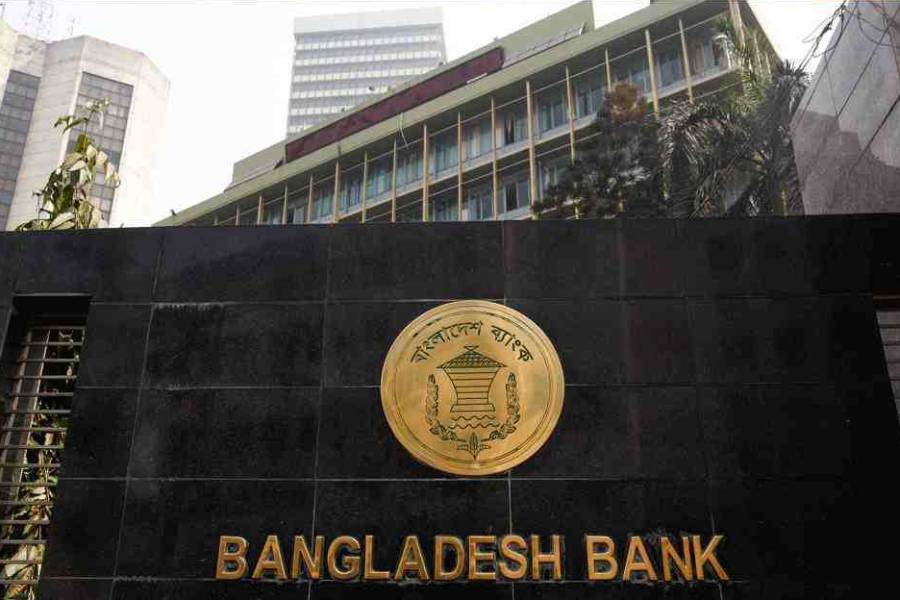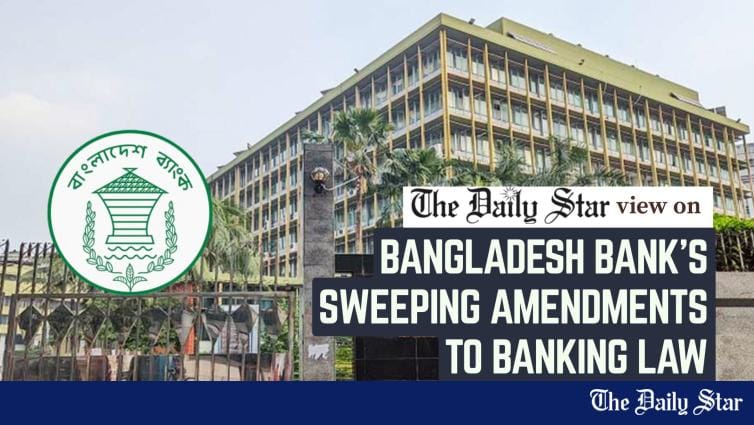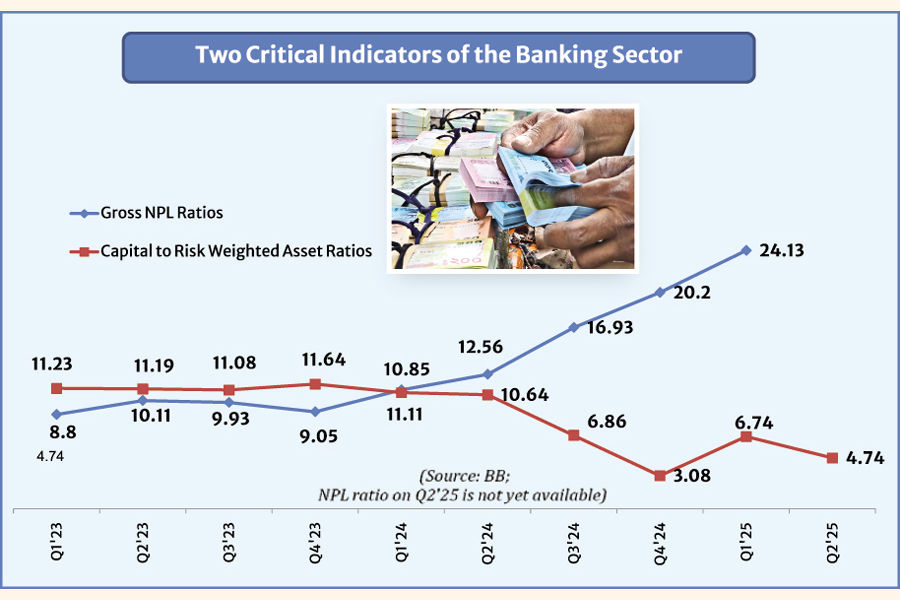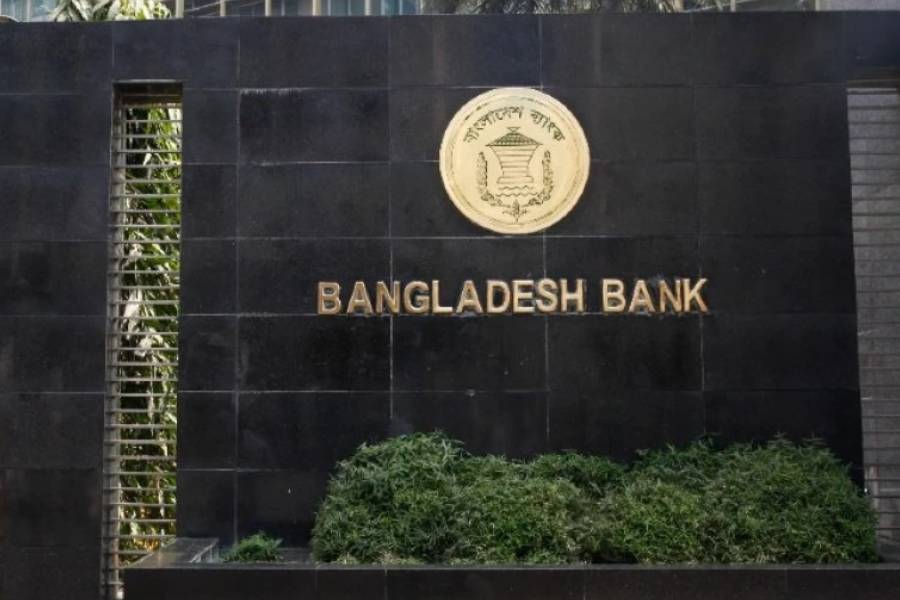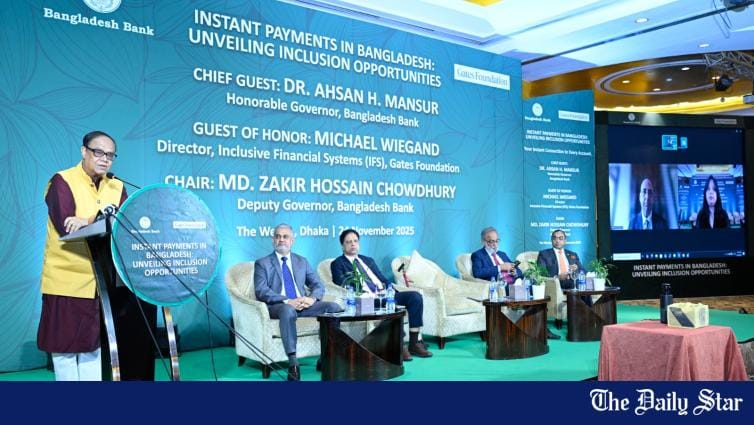Saif
Senior Member
- Joined
- Jan 24, 2024
- Messages
- 15,574
- Reaction score
- 7,889
- Nation

- Axis Group

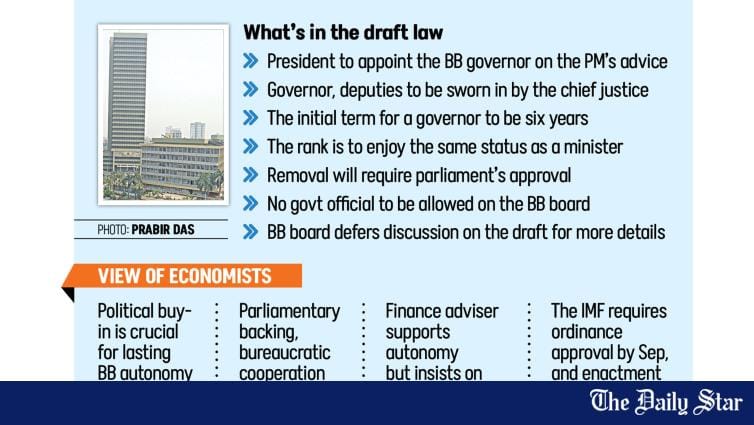
Without political will, reforms may stay on paper
Economists have welcomed the interim government’s initiative to grant full autonomy to the Bangladesh Bank (BB) but say the reforms will remain on paper unless political parties commit to endorsing and continuing them once in power.
BB autonomy
Without political will, reforms may stay on paper
Say economists as changes to central bank law deferred for further discussion

Economists have welcomed the interim government's initiative to grant full autonomy to the Bangladesh Bank (BB) but say the reforms will remain on paper unless political parties commit to endorsing and continuing them once in power.
The call comes as the central bank board, at a meeting on Wednesday, cleared amendments to the Bank Company Act but deferred the draft Bangladesh Bank Ordinance (Amendment) 2025 for further discussion.
Bank Company Act is the main law governing how banks operate in the country, while the Bangladesh Bank Order is the founding law that created the BB.
The board instructed officials concerned to submit a detailed breakdown of the proposed changes, their rationale, and the sections to be amended, for consideration in a separate meeting.
THE PROPOSED AMENDMENTS
The draft ordinance, prepared in line with the recommendations of the International Monetary Fund (IMF), proposes sweeping governance reforms aligned with global best practices.
It would elevate the governor's post to ministerial rank, require an oath before the chief justice, and introduce a double-layer appointment process.
According to draft, a six-member search committee would propose candidates, from which the president would make the final choice on the prime minister's recommendation, subject to parliamentary approval and "fit and proper" criteria.
BB board of directors would comprise the governor, two deputy governors nominated by the governor, and eight other directors appointed by the government from a list submitted by the governor.
No serving government officials could sit on the board, and no appointments could be made outside the nominated list.
NEED FOR POLITICAL WILL
Speaking on the proposed amendments, Prof Mustafizur Rahman, distinguished fellow at the Centre for Policy Dialogue (CPD), said the government is taking steps to "somewhat restrict the hands and feet of politicians," but political actors could still undermine the reforms if they want.
"That's why this must be viewed by politicians from a perspective of enlightened self-interest," he said, noting that reforms cannot always be implemented without political will.
"They should recognise that if the Bangladesh Bank remains independent and can make decisions independently, it will be good for the country's economy and for politics as well. Because if the economy fares well, politicians can also remain at ease," the economist added.
He stressed that the appointment process must ensure professionalism and parliamentary scrutiny, making the governorship "like a constitutional post, providing both security and accountability."
"In a democratic system, parliament is the highest body. If democracy is well-established, then they will have both the opportunity to work independently and the accountability," he added.
INDEPENDENCE ON PAPER VS PRACTICE
Prof Selim Raihan, executive director of the South Asian Network on Economic Modeling (Sanem), said independence of the BB has long been demanded, but rules alone cannot guarantee it.
He argued that there must be political commitment to ensure the BB's autonomy, and the ordinance must be endorsed by future parliaments.
"Many of our commissions are, on paper, already given independence, or in many cases, their appointments are bound by constitutional procedures. But these often did not work in practice, as they were altered under political influence," he said.
Raihan noted that other laws in the banking sector hinder central bank independence and governance. "Those will also have to be amended. Ensuring coordination across the entire inter-agency and departmental network will also be necessary."
He also cautioned against entirely removing bureaucratic involvement, saying civil service support is necessary for execution.
"Many tasks cannot be executed entirely without them. There needs to be a proper balance in this regard. Otherwise, the central bank may not get proper support from the finance ministry or other ministries.
"However, bureaucrats should never head these institutions," he said.
Raihan said currently, no such process exists to create pressure on the next government to continue the reforms that have begun and to secure commitments from them.
Calling for discussion on these matters, he said, "Or else, many things will happen on paper now, but later we will see they are not being implemented in reality."
CAPACITY AND ACCOUNTABILITY
Meanwhile, Finance Adviser Salehuddin Ahmed told reporters on Tuesday that he supports BB's autonomy in principle but it "must be earned" through capacity, integrity and efficiency.
"The Bangladesh Bank must have capacity, integrity, and efficiency. If you judge, do all the officials of the central bank have that? There is also such a thing as checks and balances," he said.
"If you are not capable but remain in the chair, what good is autonomy? I am not opposing autonomy. But autonomy does not mean handing over everything. In no country in the world is there full autonomy," he added.
On political engagement, Ahmed said the interim government has spoken with political parties about reforms in the banking and financial sectors, and the parties have broadly agreed to support and carry them forward.
The government aims to complete short-term reforms by February, leaving medium and long-term reforms to the next elected administration.
Under the conditions of the IMF $5.5 billion loan programme, the draft related to the BB autonomy should be approved by the advisory committee by September. And the ordinance should be issued within next December.
Without political will, reforms may stay on paper
Say economists as changes to central bank law deferred for further discussion
Economists have welcomed the interim government's initiative to grant full autonomy to the Bangladesh Bank (BB) but say the reforms will remain on paper unless political parties commit to endorsing and continuing them once in power.
The call comes as the central bank board, at a meeting on Wednesday, cleared amendments to the Bank Company Act but deferred the draft Bangladesh Bank Ordinance (Amendment) 2025 for further discussion.
Bank Company Act is the main law governing how banks operate in the country, while the Bangladesh Bank Order is the founding law that created the BB.
The board instructed officials concerned to submit a detailed breakdown of the proposed changes, their rationale, and the sections to be amended, for consideration in a separate meeting.
THE PROPOSED AMENDMENTS
The draft ordinance, prepared in line with the recommendations of the International Monetary Fund (IMF), proposes sweeping governance reforms aligned with global best practices.
It would elevate the governor's post to ministerial rank, require an oath before the chief justice, and introduce a double-layer appointment process.
According to draft, a six-member search committee would propose candidates, from which the president would make the final choice on the prime minister's recommendation, subject to parliamentary approval and "fit and proper" criteria.
BB board of directors would comprise the governor, two deputy governors nominated by the governor, and eight other directors appointed by the government from a list submitted by the governor.
No serving government officials could sit on the board, and no appointments could be made outside the nominated list.
NEED FOR POLITICAL WILL
Speaking on the proposed amendments, Prof Mustafizur Rahman, distinguished fellow at the Centre for Policy Dialogue (CPD), said the government is taking steps to "somewhat restrict the hands and feet of politicians," but political actors could still undermine the reforms if they want.
"That's why this must be viewed by politicians from a perspective of enlightened self-interest," he said, noting that reforms cannot always be implemented without political will.
"They should recognise that if the Bangladesh Bank remains independent and can make decisions independently, it will be good for the country's economy and for politics as well. Because if the economy fares well, politicians can also remain at ease," the economist added.
He stressed that the appointment process must ensure professionalism and parliamentary scrutiny, making the governorship "like a constitutional post, providing both security and accountability."
"In a democratic system, parliament is the highest body. If democracy is well-established, then they will have both the opportunity to work independently and the accountability," he added.
INDEPENDENCE ON PAPER VS PRACTICE
Prof Selim Raihan, executive director of the South Asian Network on Economic Modeling (Sanem), said independence of the BB has long been demanded, but rules alone cannot guarantee it.
He argued that there must be political commitment to ensure the BB's autonomy, and the ordinance must be endorsed by future parliaments.
"Many of our commissions are, on paper, already given independence, or in many cases, their appointments are bound by constitutional procedures. But these often did not work in practice, as they were altered under political influence," he said.
Raihan noted that other laws in the banking sector hinder central bank independence and governance. "Those will also have to be amended. Ensuring coordination across the entire inter-agency and departmental network will also be necessary."
He also cautioned against entirely removing bureaucratic involvement, saying civil service support is necessary for execution.
"Many tasks cannot be executed entirely without them. There needs to be a proper balance in this regard. Otherwise, the central bank may not get proper support from the finance ministry or other ministries.
"However, bureaucrats should never head these institutions," he said.
Raihan said currently, no such process exists to create pressure on the next government to continue the reforms that have begun and to secure commitments from them.
Calling for discussion on these matters, he said, "Or else, many things will happen on paper now, but later we will see they are not being implemented in reality."
CAPACITY AND ACCOUNTABILITY
Meanwhile, Finance Adviser Salehuddin Ahmed told reporters on Tuesday that he supports BB's autonomy in principle but it "must be earned" through capacity, integrity and efficiency.
"The Bangladesh Bank must have capacity, integrity, and efficiency. If you judge, do all the officials of the central bank have that? There is also such a thing as checks and balances," he said.
"If you are not capable but remain in the chair, what good is autonomy? I am not opposing autonomy. But autonomy does not mean handing over everything. In no country in the world is there full autonomy," he added.
On political engagement, Ahmed said the interim government has spoken with political parties about reforms in the banking and financial sectors, and the parties have broadly agreed to support and carry them forward.
The government aims to complete short-term reforms by February, leaving medium and long-term reforms to the next elected administration.
Under the conditions of the IMF $5.5 billion loan programme, the draft related to the BB autonomy should be approved by the advisory committee by September. And the ordinance should be issued within next December.

